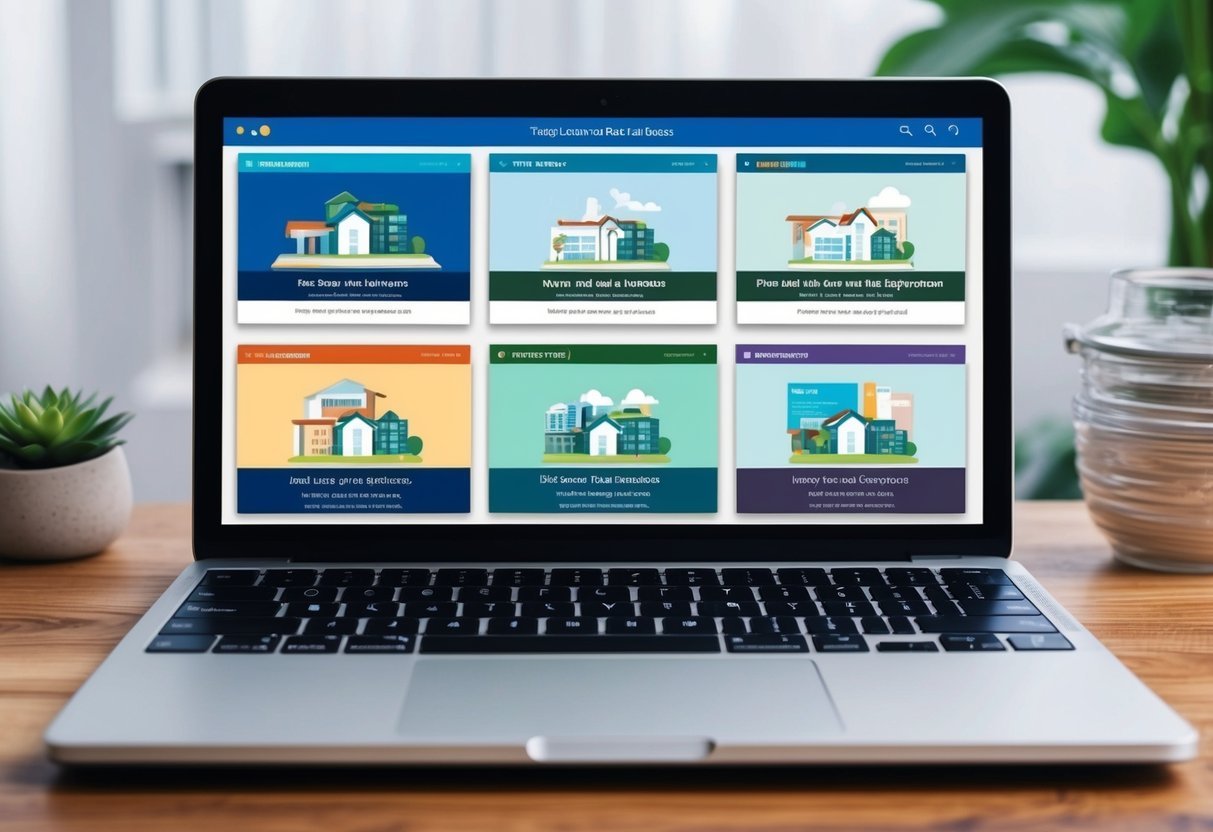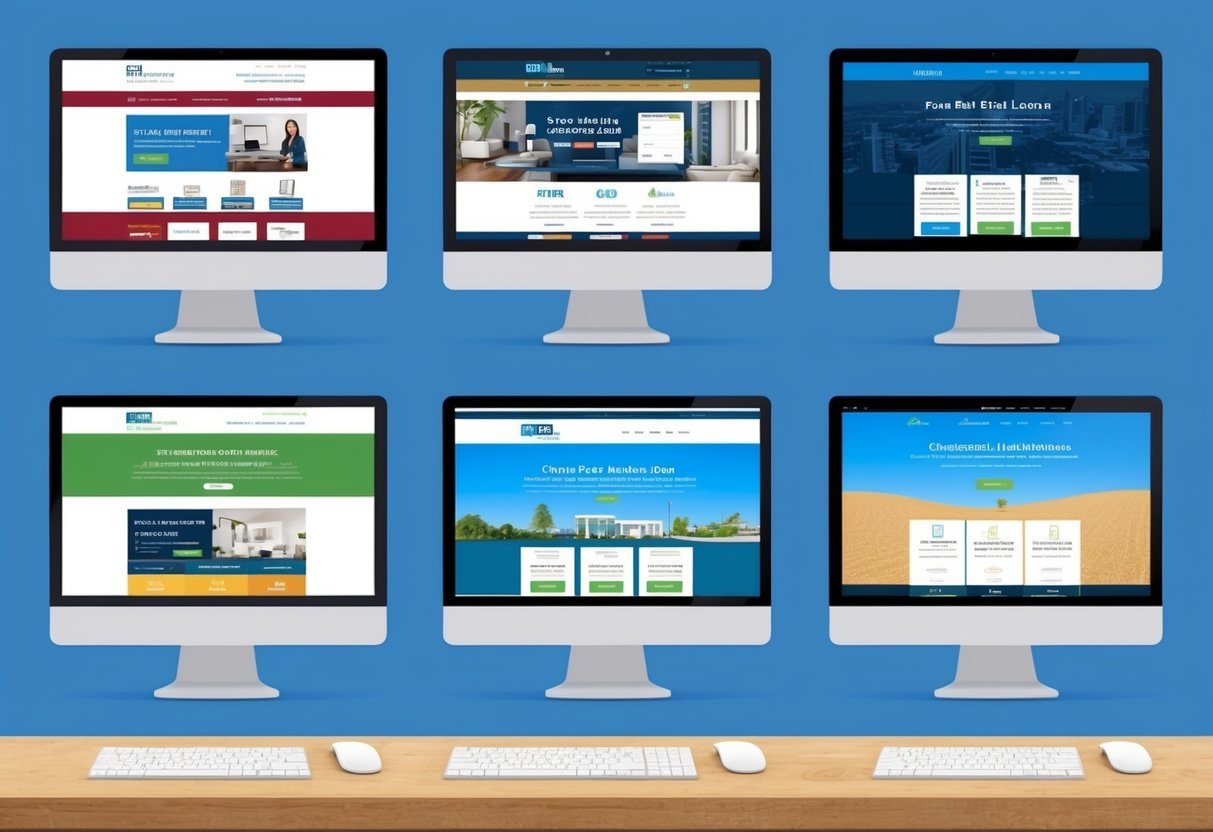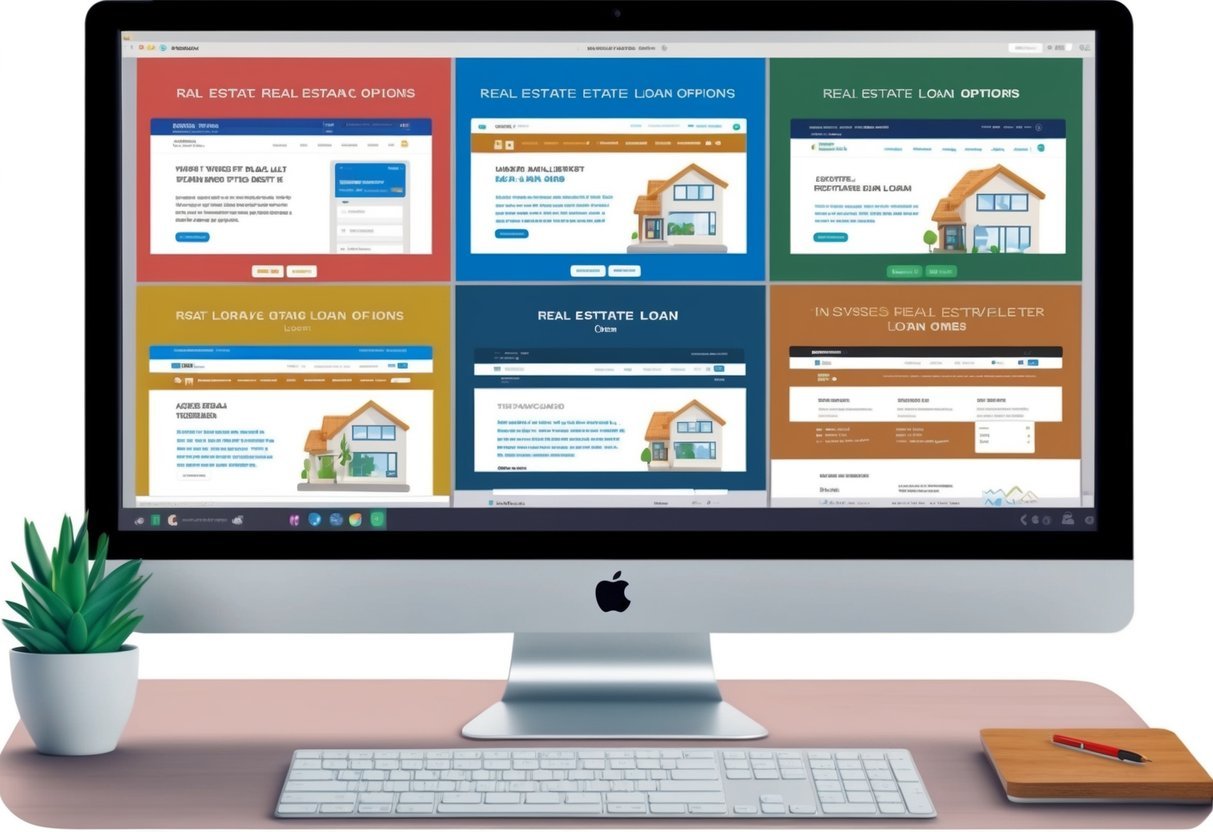Navigating the world of real estate loans can be overwhelming.
You need to do careful research and comparison to find the right option for your needs.
With numerous lenders and loan types available, finding the right option for your needs requires careful research and comparison.
Fortunately, several websites offer tools and resources to simplify this process.

These online platforms allow you to compare multiple loan offers side-by-side, helping you make an informed decision about your real estate financing. By utilizing these comparison websites, you can save time and potentially discover better rates or terms than you might find on your own.
Whether you’re a first-time homebuyer or a seasoned investor, these tools can provide valuable insights into the current mortgage market.
1) Zillow Mortgage Marketplace

Zillow Mortgage Marketplace offers a convenient platform for comparing various mortgage options.
You can explore different loan types, including conventional, FHA, VA, and jumbo loans.
The marketplace allows you to input your specific financial details and property information to receive personalized rate quotes.
This feature helps you understand what terms you might qualify for based on your unique situation.
You’ll find a range of mortgage products with different down payment requirements and loan terms.
For example, conventional loans may offer down payments as low as 3%, while FHA loans typically require 3.5%.
Zillow’s platform includes both fixed-rate and adjustable-rate mortgages (ARMs).
Fixed-rate options provide stability, while ARMs might offer lower initial rates that could benefit certain borrowers.
When using the marketplace, you can compare offers from multiple lenders side by side.
This comparison helps you identify the most competitive rates and terms available to you.
Zillow Home Loans, the company’s lending arm, is often featured alongside other lenders.
However, you’re not obligated to choose their services and are encouraged to shop around.
Keep in mind that while Zillow provides a wealth of information, it’s crucial to verify the details of any loan offer directly with the lender before making a decision.
2) Bankrate.com
Bankrate.com offers a comprehensive platform for comparing mortgage rates and loan options.
You can easily access current mortgage interest rate trends for various loan types.
The website provides tools to help you make informed decisions about your real estate financing.
You’ll find a user-friendly interface that allows you to input your specific loan requirements and receive personalized rate quotes.
Bankrate.com also offers educational resources to guide you through the mortgage process.
You can learn about different loan types, terms, and how to compare mortgage offers effectively.
The site features a loan comparison calculator that enables you to evaluate multiple loan options side by side.
This tool can help you determine which loan best fits your financial situation and goals.
By utilizing Bankrate.com, you can gain valuable insights into the current mortgage market.
The site updates its rates regularly, ensuring you have access to the most recent information when shopping for a real estate loan.
Remember to consider factors beyond just the interest rate when comparing loan options.
Bankrate.com can help you understand the full picture, including fees, terms, and potential savings over the life of the loan.
3) LendingTree
LendingTree offers a convenient platform for comparing multiple mortgage offers from various lenders.
You can easily input your information and receive quotes from several financial institutions.
The website provides current mortgage rates updated regularly, allowing you to stay informed about market trends.
As of September 19, 2024, the average 30-year fixed-rate mortgage was 6.09%, while the 15-year fixed-rate mortgage stood at 5.15%.
When using LendingTree, it’s crucial to know your credit scores.
This information helps you determine which loan programs might be suitable for your situation.
Conventional loans typically require a score above 620, while FHA loans may be an option if your score falls between 500 and 619.
LendingTree has been connecting borrowers with lenders for nearly three decades.
Their model ensures you can compare multiple options without having to contact individual lenders yourself.
By utilizing LendingTree’s services, you can potentially save money on your mortgage.
Research suggests that obtaining more quotes often leads to greater savings on your loan.
Remember to carefully review all offers and consider factors beyond just interest rates when making your decision.
Look at closing costs, loan terms, and lender reputation to find the best fit for your real estate financing needs.
4) Quicken Loans

Quicken Loans, now known as Rocket Mortgage, offers a variety of home loan options to suit your needs.
You can explore fixed-rate mortgages, adjustable-rate mortgages (ARMs), and government-backed loans like FHA and VA.
When comparing loan options on their website, you’ll find detailed information about each product.
This includes eligibility requirements, interest rates, and potential benefits for different borrower profiles.
Quicken Loans is particularly known for its FHA loan program, which may be suitable if you have a lower credit score or limited funds for a down payment.
These loans can require as little as 3.5% down.
The company’s online platform allows you to easily compare mortgage rates and terms.
You can input your specific financial information to receive personalized quotes.
Quicken Loans also offers tools and resources to help you understand the mortgage process.
Their learning center provides articles and guides on various loan types and how to choose the best option for your situation.
Remember to consider factors like loan terms, interest rates, and fees when comparing options.
Each loan type has its own advantages and potential drawbacks, so it’s important to assess which aligns best with your financial goals and circumstances.
5) NerdWallet Mortgage

NerdWallet offers a comprehensive platform for comparing mortgage options from various lenders.
You can easily access current interest rates, APRs, and monthly payment estimates for different loan types.
The website provides tools to help you determine the best mortgage loan for your specific situation.
You’ll find calculators and guides to assess how much you can afford and which loan features suit your needs.
NerdWallet showcases reviews of top mortgage lenders, allowing you to compare their ratings, fees, and available loan terms.
This information can be invaluable when selecting a lender for your real estate purchase.
If you prefer a digital experience, NerdWallet highlights online mortgage lenders that offer easy preapproval processes.
These lenders cater to various borrower profiles, including first-time buyers and those seeking jumbo loans.
The platform also features detailed mortgage lender reviews, giving you insight into customer service quality and loan product variety.
You can use these reviews to make informed decisions about potential lenders.
By utilizing NerdWallet’s resources, you can streamline your mortgage search and find options that align with your real estate goals.
The site’s user-friendly interface makes it easy to navigate and compare multiple loan offers efficiently.
6) SmartAsset Mortgage Comparison

SmartAsset offers a comprehensive platform for comparing mortgage options.
You can explore current mortgage rates and trends to make informed decisions about your home loan.
The website provides a user-friendly interface that allows you to input your specific financial details.
This personalization helps you receive more accurate rate estimates tailored to your situation.
SmartAsset’s comparison tool includes a wide range of mortgage lenders.
You’ll find options for conventional fixed-rate loans, adjustable-rate mortgages, FHA loans, VA loans, and jumbo loans.
One unique feature is the YOURgage program, which lets you customize your loan term.
This flexibility can be particularly helpful if you have specific financial goals or constraints.
When using SmartAsset, you can easily compare APRs, monthly payments, and other important loan terms.
This side-by-side comparison simplifies the process of finding the best mortgage for your needs.
The platform also offers educational resources to help you choose a mortgage lender.
These guides can be invaluable as you navigate the complex world of home financing.
Understanding Real Estate Loans

Real estate loans come in various forms, each tailored to different borrower needs and property types.
Familiarizing yourself with loan options and key terms will help you make informed decisions when financing a property purchase.
Types of Real Estate Loans
Fixed-rate mortgages offer stability with a consistent interest rate and monthly payment throughout the loan term.
These are popular for their predictability, typically lasting 15 or 30 years.
Adjustable-rate mortgages (ARMs) start with a lower interest rate that can change over time.
This option may benefit you if you plan to sell or refinance within a few years.
Government-backed loans like FHA, VA, and USDA mortgages offer more lenient qualification requirements.
These can be excellent choices if you have a lower credit score or limited funds for a down payment.
Jumbo loans are designed for high-value properties exceeding conforming loan limits.
They often require larger down payments and excellent credit scores.
Key Terminology
Annual Percentage Rate (APR): This figure includes your interest rate plus other loan costs, giving you a more comprehensive view of your total borrowing expenses.
Down Payment: The initial lump sum you pay upfront when purchasing a property.
Conventional loans typically require 3-20% down.
Private Mortgage Insurance (PMI): Required for conventional loans with less than 20% down, PMI protects the lender if you default.
Loan-to-Value Ratio (LTV): This percentage compares your loan amount to the property’s value.
A lower LTV often results in better loan terms.
Debt-to-Income Ratio (DTI): Your monthly debt payments divided by your gross monthly income.
Lenders use this to assess your ability to manage monthly payments.
Criteria for Comparing Loan Options

When evaluating real estate loan options, consider these key factors to make an informed decision.
Each element plays a crucial role in determining the best financing solution for your property investment.
Interest Rates
Interest rates significantly impact your monthly payments and overall loan cost. Compare offers from multiple lenders to find competitive rates.
Fixed rates provide stability, while adjustable rates may offer lower initial payments.
Pay attention to Annual Percentage Rate (APR), which includes both interest and fees.
A lower APR generally indicates a better deal.
Consider how rate fluctuations might affect your budget if you choose an adjustable-rate mortgage.
Ask lenders about rate caps and adjustment frequency.
Loan Terms
The loan term affects both monthly payments and total interest paid.
Shorter terms typically have higher monthly payments but lower overall costs.
Standard terms include 15, 20, and 30 years. Evaluate different loan types, such as conventional, FHA, VA, and USDA loans, to find the best fit for your situation.
Consider your long-term financial goals.
A 15-year mortgage builds equity faster but requires higher monthly payments.
A 30-year term offers lower payments but costs more in interest over time.
Fee Structures
Understanding fee structures helps you avoid surprises and compare true costs.
Common fees include origination fees, appraisal fees, and closing costs.
Request a detailed breakdown of all fees from each lender.
Some fees may be negotiable, so don’t hesitate to ask for discounts or waivers.
Watch for prepayment penalties, which can limit your ability to refinance or sell the property. Compare loan estimates from different lenders to identify the most cost-effective option.
Consider the impact of points.
Paying points upfront can lower your interest rate but increases closing costs.
Calculate the break-even point to determine if points are worthwhile for your situation.
Frequently Asked Questions

Navigating the mortgage landscape can be complex.
Key considerations include evaluating lenders, assessing options for first-time buyers, comparing loan terms, and utilizing online tools.
What criteria should be used when evaluating different mortgage lenders?
When choosing a mortgage lender, you should compare interest rates, fees, and loan terms.
Look for lenders with positive customer reviews and a track record of timely closings.
Consider the lender’s communication style and responsiveness.
A good lender will be transparent about costs and willing to answer your questions thoroughly.
How can first-time buyers assess the best mortgage options available?
First-time buyers should start by getting preapproved with multiple lenders.
This allows you to compare actual loan offers rather than just advertised rates.
Research first-time homebuyer programs in your area.
These may offer down payment assistance or more favorable terms.
What should buyers consider when comparing real estate loan terms?
Pay attention to the annual percentage rate (APR), not just the interest rate.
The APR includes fees and gives a more accurate picture of the loan’s total cost.
Evaluate the loan’s term length and whether it’s fixed or adjustable.
Consider how these factors align with your long-term financial goals.
Which websites provide the most comprehensive comparisons of real estate loan rates?
Zillow Mortgage Marketplace offers side-by-side comparisons of multiple lenders.
Bankrate.com provides detailed rate information and consumer reviews.
LendingTree allows you to receive multiple offers from different lenders after submitting a single application.
What tools are available to estimate monthly mortgage payments for various loan options?
Most major lending websites offer mortgage calculators.
These tools let you input different loan amounts, interest rates, and terms to estimate monthly payments.
NerdWallet’s mortgage calculator includes additional factors like property taxes and insurance for a more comprehensive estimate.
How do high credit scores impact mortgage lender choices and loan conditions?
Typically, a high credit score gives you access to more lenders and better loan terms.
You’re more likely to qualify for lower interest rates, potentially saving thousands over the life of the loan.
Some lenders specialize in working with high-credit borrowers, offering premium services or unique loan products.

